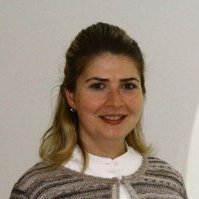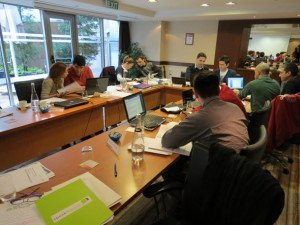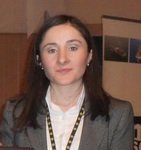I grew up as an only child, with a single mother. Because we were poor and because I knew my father had emigrated from Syria, I imagined he looked like Omar Sharif. I hoped he would be rich and kind and would come into our lives (and our not yet furnished apartment) and help us. Later, after I’d met my father, I tried to believe he’d changed his number and left no forwarding address because he was an idealistic revolutionary, plotting a new world for the Arab people.
Even as a feminist, my whole life I’d been waiting for a man to love, who could love me. For decades, I’d thought that man would be my father. When I was 25, I met that man and he was my brother.
By then, I lived in New York, where I was trying to write my first novel. I had a job at a small magazine in an office the size of a closet, with three other aspiring writers. When one day a lawyer called me — me, the middle-class girl from California who hassled the boss to buy us health insurance — and said his client was rich and famous and was my long-lost brother, the young editors went wild. This was 1985 and we worked at a cutting-edge literary magazine, but I’d fallen into the plot of a Dickens novel and really, we all loved those best. The lawyer refused to tell me my brother’s name and my colleagues started a betting pool. The leading candidate: John Travolta. I secretly hoped for a literary descendant of Henry James — someone more talented than I, someone brilliant without even trying.
When I met Steve, he was a guy my age in jeans, Arab- or Jewish-looking and handsomer than Omar Sharif.
We took a long walk — something, it happened, that we both liked to do. I don’t remember much of what we said that first day, only that he felt like someone I’d pick to be a friend. He explained that he worked in computers.
I didn’t know much about computers. I still worked on a manual Olivetti typewriter.
I told Steve I’d recently considered my first purchase of a computer: something called the Cromemco.
Steve told me it was a good thing I’d waited. He said he was making something that was going to be insanely beautiful.
I want to tell you a few things I learned from Steve, during three distinct periods, over the 27 years I knew him. They’re not periods of years, but of states of being. His full life. His illness. His dying.
Steve worked at what he loved. He worked really hard. Every day.
That’s incredibly simple, but true.
He was the opposite of absent-minded.
He was never embarrassed about working hard, even if the results were failures. If someone as smart as Steve wasn’t ashamed to admit trying, maybe I didn’t have to be.
When he got kicked out of Apple, things were painful. He told me about a dinner at which 500 Silicon Valley leaders met the then-sitting president. Steve hadn’t been invited.
He was hurt but he still went to work at Next. Every single day.
Novelty was not Steve’s highest value. Beauty was.
For an innovator, Steve was remarkably loyal. If he loved a shirt, he’d order 10 or 100 of them. In the Palo Alto house, there are probably enough black cotton turtlenecks for everyone in this church.
He didn’t favor trends or gimmicks. He liked people his own age.
His philosophy of aesthetics reminds me of a quote that went something like this: “Fashion is what seems beautiful now but looks ugly later; art can be ugly at first but it becomes beautiful later.”
Steve always aspired to make beautiful later.
He was willing to be misunderstood.
Uninvited to the ball, he drove the third or fourth iteration of his same black sports car to Next, where he and his team were quietly inventing the platform on which Tim Berners-Lee would write the program for the World Wide Web.
Steve was like a girl in the amount of time he spent talking about love. Love was his supreme virtue, his god of gods. He tracked and worried about the romantic lives of the people working with him.
Whenever he saw a man he thought a woman might find dashing, he called out, “Hey are you single? Do you wanna come to dinner with my sister?”
I remember when he phoned the day he met Laurene. “There’s this beautiful woman and she’s really smart and she has this dog and I’m going to marry her.”
When Reed was born, he began gushing and never stopped. He was a physical dad, with each of his children. He fretted over Lisa’s boyfriends and Erin’s travel and skirt lengths and Eve’s safety around the horses she adored.
None of us who attended Reed’s graduation party will ever forget the scene of Reed and Steve slow dancing.
His abiding love for Laurene sustained him. He believed that love happened all the time, everywhere. In that most important way, Steve was never ironic, never cynical, never pessimistic. I try to learn from that, still.
Steve had been successful at a young age, and he felt that had isolated him. Most of the choices he made from the time I knew him were designed to dissolve the walls around him. A middle-class boy from Los Altos, he fell in love with a middle-class girl from New Jersey. It was important to both of them to raise Lisa, Reed, Erin and Eve as grounded, normal children. Their house didn’t intimidate with art or polish; in fact, for many of the first years I knew Steve and Lo together, dinner was served on the grass, and sometimes consisted of just one vegetable. Lots of that one vegetable. But one. Broccoli. In season. Simply prepared. With just the right, recently snipped, herb.
Even as a young millionaire, Steve always picked me up at the airport. He’d be standing there in his jeans.
When a family member called him at work, his secretary Linetta answered, “Your dad’s in a meeting. Would you like me to interrupt him?”
When Reed insisted on dressing up as a witch every Halloween, Steve, Laurene, Erin and Eve all went wiccan.
They once embarked on a kitchen remodel; it took years. They cooked on a hotplate in the garage. The Pixar building, under construction during the same period, finished in half the time. And that was it for the Palo Alto house. The bathrooms stayed old. But — and this was a crucial distinction — it had been a great house to start with; Steve saw to that.
This is not to say that he didn’t enjoy his success: he enjoyed his success a lot, just minus a few zeros. He told me how much he loved going to the Palo Alto bike store and gleefully realizing he could afford to buy the best bike there.
And he did.
Steve was humble. Steve liked to keep learning.
Once, he told me if he’d grown up differently, he might have become a mathematician. He spoke reverently about colleges and loved walking around the Stanford campus. In the last year of his life, he studied a book of paintings by Mark Rothko, an artist he hadn’t known about before, thinking of what could inspire people on the walls of a future Apple campus.
Steve cultivated whimsy. What other C.E.O. knows the history of English and Chinese tea roses and has a favorite David Austin rose?
He had surprises tucked in all his pockets. I’ll venture that Laurene will discover treats — songs he loved, a poem he cut out and put in a drawer — even after 20 years of an exceptionally close marriage. I spoke to him every other day or so, but when I opened The New York Times and saw a feature on the company’s patents, I was still surprised and delighted to see a sketch for a perfect staircase.
With his four children, with his wife, with all of us, Steve had a lot of fun.
He treasured happiness.
Then, Steve became ill and we watched his life compress into a smaller circle. Once, he’d loved walking through Paris. He’d discovered a small handmade soba shop in Kyoto. He downhill skied gracefully. He cross-country skied clumsily. No more.
Eventually, even ordinary pleasures, like a good peach, no longer appealed to him.
Yet, what amazed me, and what I learned from his illness, was how much was still left after so much had been taken away.
I remember my brother learning to walk again, with a chair. After his liver transplant, once a day he would get up on legs that seemed too thin to bear him, arms pitched to the chair back. He’d push that chair down the Memphis hospital corridor towards the nursing station and then he’d sit down on the chair, rest, turn around and walk back again. He counted his steps and, each day, pressed a little farther.
Laurene got down on her knees and looked into his eyes.
“You can do this, Steve,” she said. His eyes widened. His lips pressed into each other.
He tried. He always, always tried, and always with love at the core of that effort. He was an intensely emotional man.
I realized during that terrifying time that Steve was not enduring the pain for himself. He set destinations: his son Reed’s graduation from high school, his daughter Erin’s trip to Kyoto, the launching of a boat he was building on which he planned to take his family around the world and where he hoped he and Laurene would someday retire.
Even ill, his taste, his discrimination and his judgment held. He went through 67 nurses before finding kindred spirits and then he completely trusted the three who stayed with him to the end. Tracy. Arturo. Elham.
One time when Steve had contracted a tenacious pneumonia his doctor forbid everything — even ice. We were in a standard I.C.U. unit. Steve, who generally disliked cutting in line or dropping his own name, confessed that this once, he’d like to be treated a little specially.
I told him: Steve, this is special treatment.
He leaned over to me, and said: “I want it to be a little more special.”
Intubated, when he couldn’t talk, he asked for a notepad. He sketched devices to hold an iPad in a hospital bed. He designed new fluid monitors and x-ray equipment. He redrew that not-quite-special-enough hospital unit. And every time his wife walked into the room, I watched his smile remake itself on his face.
For the really big, big things, you have to trust me, he wrote on his sketchpad. He looked up. You have to.
By that, he meant that we should disobey the doctors and give him a piece of ice.
None of us knows for certain how long we’ll be here. On Steve’s better days, even in the last year, he embarked upon projects and elicited promises from his friends at Apple to finish them. Some boat builders in the Netherlands have a gorgeous stainless steel hull ready to be covered with the finishing wood. His three daughters remain unmarried, his two youngest still girls, and he’d wanted to walk them down the aisle as he’d walked me the day of my wedding.
We all — in the end — die in medias res. In the middle of a story. Of many stories.
I suppose it’s not quite accurate to call the death of someone who lived with cancer for years unexpected, but Steve’s death was unexpected for us.
What I learned from my brother’s death was that character is essential: What he was, was how he died.
Tuesday morning, he called me to ask me to hurry up to Palo Alto. His tone was affectionate, dear, loving, but like someone whose luggage was already strapped onto the vehicle, who was already on the beginning of his journey, even as he was sorry, truly deeply sorry, to be leaving us.
He started his farewell and I stopped him. I said, “Wait. I’m coming. I’m in a taxi to the airport. I’ll be there.”
“I’m telling you now because I’m afraid you won’t make it on time, honey.”
When I arrived, he and his Laurene were joking together like partners who’d lived and worked together every day of their lives. He looked into his children’s eyes as if he couldn’t unlock his gaze.
Until about 2 in the afternoon, his wife could rouse him, to talk to his friends from Apple.
Then, after awhile, it was clear that he would no longer wake to us.
His breathing changed. It became severe, deliberate, purposeful. I could feel him counting his steps again, pushing farther than before.
This is what I learned: he was working at this, too. Death didn’t happen to Steve, he achieved it.
He told me, when he was saying goodbye and telling me he was sorry, so sorry we wouldn’t be able to be old together as we’d always planned, that he was going to a better place.
Dr. Fischer gave him a 50/50 chance of making it through the night.
He made it through the night, Laurene next to him on the bed sometimes jerked up when there was a longer pause between his breaths. She and I looked at each other, then he would heave a deep breath and begin again.
This had to be done. Even now, he had a stern, still handsome profile, the profile of an absolutist, a romantic. His breath indicated an arduous journey, some steep path, altitude.
He seemed to be climbing.
But with that will, that work ethic, that strength, there was also sweet Steve’s capacity for wonderment, the artist’s belief in the ideal, the still more beautiful later.
Steve’s final words, hours earlier, were monosyllables, repeated three times.
Before embarking, he’d looked at his sister Patty, then for a long time at his children, then at his life’s partner, Laurene, and then over their shoulders past them.












